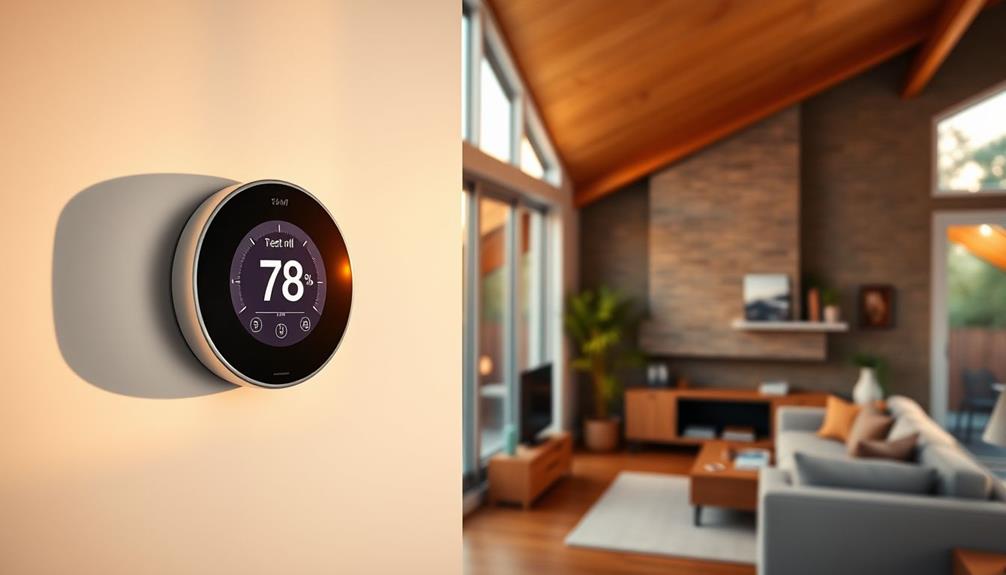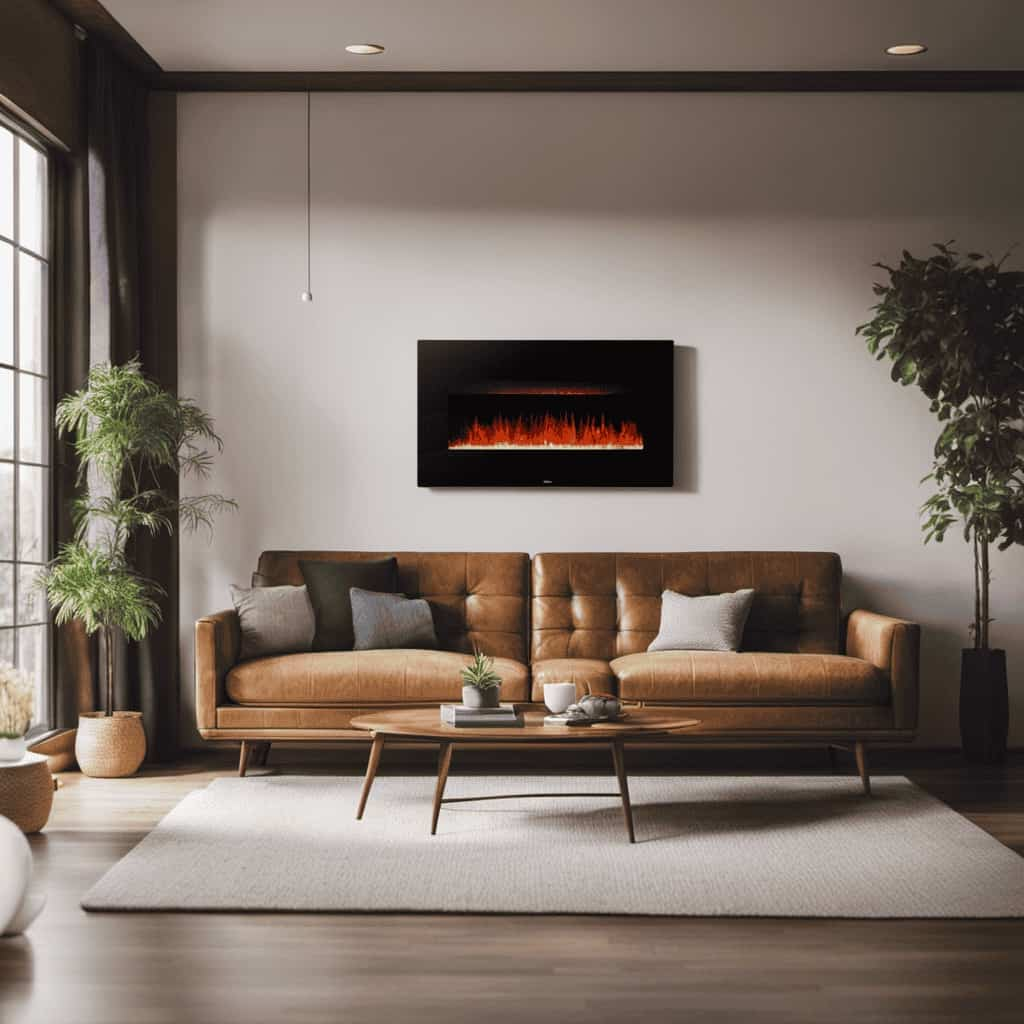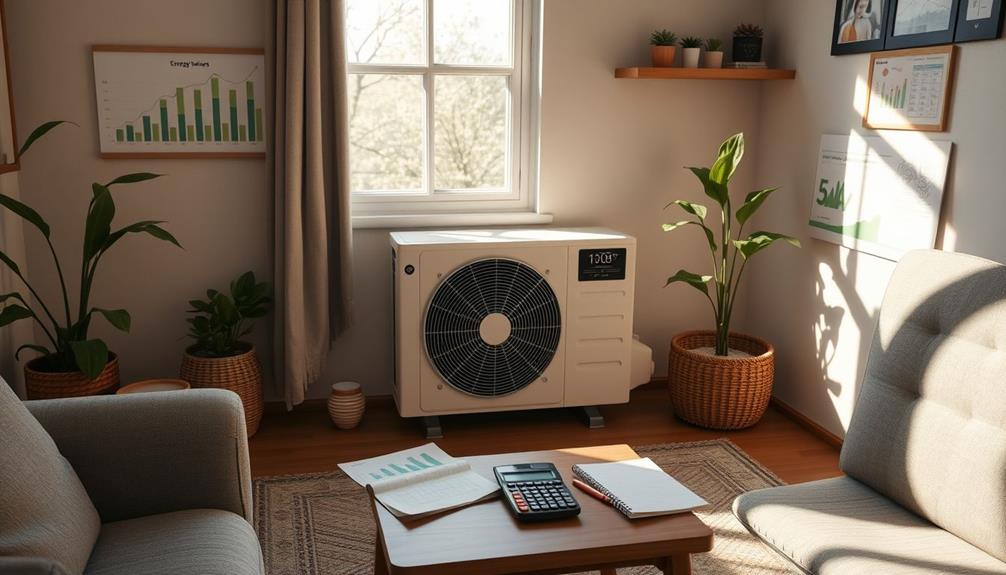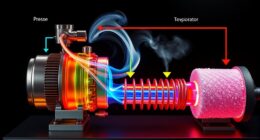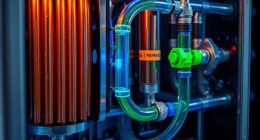When it comes to heat pumps, you've probably heard a few myths that just aren't true. Modern heat pumps work efficiently even in temperatures as low as -15°F, and they provide both heating and cooling. You might think they're noisy, but recent models operate quietly, often around the same volume as a refrigerator. Plus, while installation costs might seem high, the energy savings and available incentives can offset those expenses considerably. Understanding these points clears up misconceptions and highlights the true benefits of heat pumps. There's a lot more to uncover about their performance and efficiency.
Key Takeaways
- Modern heat pumps efficiently operate in temperatures as low as -15°F, dispelling the myth of poor cold-weather performance.
- Heat pumps provide both heating and cooling, effectively managing humidity levels year-round.
- Advances in technology have significantly reduced noise levels, making modern heat pumps quieter than older models.
- High installation costs are balanced by long-term energy savings and available government incentives, enhancing affordability.
- Heat pumps effectively manage humidity in humid climates when properly sized and installed, countering the myth of inefficacy in such areas.
Heat Pump Effectiveness
When it comes to heat pump effectiveness, many people still cling to outdated beliefs about their performance in cold weather. However, modern heat pumps are designed to operate efficiently even in temperatures as low as -15°F, debunking the myth that they're ineffective in colder climates.
Advances in technology have greatly improved their cold weather performance, allowing these systems to transfer heat rather than generate it, which maintains high energy efficiency. Additionally, refrigerant heat pumps are particularly versatile, providing both heating and cooling while optimizing thermal energy transfer.
You mightn't realize how reliable heating options heat pumps can be, even in the harshest winter conditions. Many models are specifically engineered for cold weather performance, ensuring you'll stay warm when it matters most.
The misconception surrounding heat pump effectiveness in these regions is unfounded, as more homeowners are adopting heat pumps over traditional heating methods.
As you explore your heating and cooling systems, consider the benefits of modern heat pumps. They offer a consistent warmth that rivals other options, all while being environmentally friendly and cost-effective.
With the right heat pump, you'll find reliable heating that keeps your home comfortable, regardless of the chill outside.
Noise Levels and Perceptions

Many homeowners worry about noise levels when evaluating heat pumps, but these concerns are often unfounded. Modern designs prioritize quiet operation, making them ideal for residential settings.
In fact, today's heat pumps operate at sound levels around 40 decibels, comparable to gas boilers and refrigerator units. Additionally, advancements in AI security technology have led to innovations that further reduce operational noise, enhancing user experience.
Here are three key points to evaluate regarding noise levels and perceptions:
- Exaggerated Perceptions: Many noise complaints stem from experiences with older models that lacked advanced noise-reduction features. These outdated units often contributed to a misconception that all heat pumps are excessively noisy.
- Low Noise Complaints: A DEFRA review revealed that only 100 noise complaints were reported for every 300,000 heat pump installations. This statistic highlights how infrequently noise issues arise with modern systems.
- Adaptability to Conditions: While noise levels may vary with weather conditions, most modern heat pumps are designed to minimize sound, ensuring a peaceful home environment.
Energy Efficiency Explained

Heat pumps stand out for their impressive energy efficiency, often achieving efficiencies of 300% or more. This means they produce three times more heat than the energy consumed. For every unit of electricity used, heat pumps deliver three or more units of heat, considerably reducing energy consumption compared to traditional heating methods.
| Aspect | Heat Pumps |
|---|---|
| Efficiency | 300% or more |
| Energy Source | Renewable sources |
| Carbon Footprint | Lower compared to traditional heating |
By extracting heat from renewable sources like air, water, and soil, heat pumps decrease reliance on fossil fuels, leading to a lower carbon footprint. Many modern heat pump systems are designed to operate efficiently in various climates, including sub-zero temperatures. This versatility not only enhances performance but also guarantees long-term savings on energy bills.
Despite some common misconceptions, investing in a heat pump can result in considerable reductions in your HVAC system's energy consumption. With their high efficiency, you'll enjoy lower energy bills while contributing to a more sustainable future. Embracing heat pumps is a smart choice for both your wallet and the environment.
Versatility in Heating and Cooling

While conventional heating and cooling systems often require separate units, a heat pump seamlessly serves both functions, ensuring your home stays comfortable all year round.
Unlike traditional systems, heat pumps can operate efficiently by extracting heat from renewable sources like air, water, or soil, making them a sustainable solution for your heating and cooling needs.
Additionally, heat pumps are designed to minimize energy consumption, considerably reducing your overall utility bills and contributing to a more eco-friendly home, which aligns with the need for energy-efficient appliances.
Here are three key benefits of heat pumps:
- Year-Round Comfort: Heat pumps can reverse their operation, efficiently heating your home in winter and cooling it during summer months.
- Versatility Across Climates: With advances in technology, heat pumps can handle a wide range of temperatures, ensuring consistent performance regardless of the weather outside.
- Space-Saving Design: Since heat pumps replace both furnaces and air conditioners, you'll save space and reduce the complexity of your HVAC system.
Maintenance Requirements

To keep your heat pump running efficiently, regular maintenance is crucial. Unlike the myth that heat pumps require constant upkeep, their maintenance requirements are quite manageable and similar to those of traditional heating systems. Typically, you should check your heat pump once or twice a year to guarantee peak performance. Incorporating well-draining soil mix into your routine maintenance can also help with improving overall efficiency, similar to how plants thrive in their ideal soil conditions.
Routine maintenance tasks include cleaning or replacing filters, checking refrigerant levels, and inspecting electrical components. These simple actions can prevent inefficiencies that might otherwise lead to costly repairs down the line. By committing to this regular maintenance, you not only maintain the efficiency of your HVAC system but also extend the lifespan of your heat pump.
For homeowners, scheduling all-encompassing maintenance services can provide peace of mind, assuring that your heat pump operates smoothly year-round. A well-maintained heat pump can deliver consistent performance, keeping your home comfortable regardless of the season.
Cost Considerations and Savings

Understanding the cost considerations of a heat pump can help you make a more informed decision about your HVAC investment. While the initial installation cost of a heat pump averages over $12,500, government rebates can offset these expenses by up to $3,900, making it a more attractive option.
As energy costs continue to rise, the potential for significant long-term savings on your energy bills becomes increasingly important, especially given the credit card insights that show how managing personal finances wisely can impact overall financial health. The energy efficiencies of heat pumps can reach 300% or more, which translates to significant long-term savings on your energy bills.
Here are some key points to keep in mind:
- Lower Running Costs: Heat pumps reduce reliance on fossil fuels, resulting in lower operating costs.
- Energy Savings: By achieving high energy efficiencies, heat pumps allow you to get more heat for each unit of electricity consumed.
- Financial Consideration: Incentives like the Boiler Upgrade Scheme make heat pump systems more affordable.
Ultimately, the combination of lower running costs and available rebates makes heat pumps a financially savvy choice compared to separate heating and cooling systems.
Frequently Asked Questions
What Is the Major Problem of Heat Pump?
You might find that heat pumps struggle in extremely low temperatures. However, modern models perform well even at -15°F, making them a viable option for cold climates despite initial installation costs and maintenance considerations.
Why Don T Contractors Like Heat Pumps?
Contractors often balk at heat pumps due to higher installation costs, perceived complexity, and a lack of training. They worry about winter performance and maintenance demands, viewing these factors as potential pitfalls in their projects.
At What Temperature Is a Heat Pump No Longer Efficient?
A heat pump's efficiency doesn't drop considerably until temperatures reach around -15°F. While performance may decrease slightly in extreme cold, many models still operate effectively, producing more heat than the electricity they consume.
Are Heat Pumps Really 300% Efficient?
Yes, heat pumps can achieve efficiencies over 300%. For every unit of electricity you use, they can deliver three or more units of heat, making them an incredibly efficient choice for heating your space.
Conclusion
So, if you thought heat pumps were just glorified fans or noisy monsters lurking in your basement, think again! These energy-efficient marvels can heat and cool your home while keeping your wallet happy. With a little maintenance and a dash of understanding, they'll outperform your wildest expectations. Embrace your inner eco-warrior; it's time to ditch the myths and let heat pumps work their magic. Who knew saving the planet could be so quiet and cost-effective?

